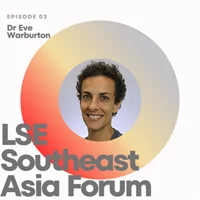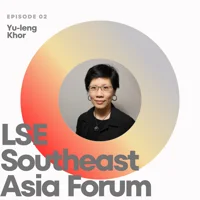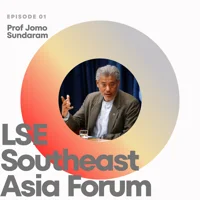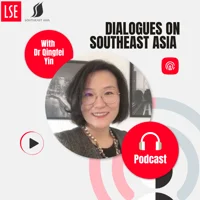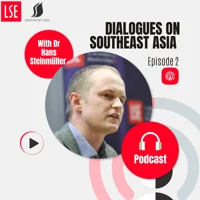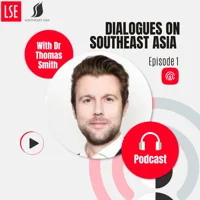Podcast

Hosted by the LSE Saw Swee Hock Southeast Asia Centre, the Dialogues on Southeast Asia podcast is dedicated to pushing the boundaries of scholarship and promoting open engagement in Southeast Asia.We strive to enhance our understanding of key issues and challenges in relation to the region through interdisciplinary approaches and insights from experts in Southeast Asia studies.
With each episode, we feature a speaker and their work in the vibrant tapestry of Southeast Asia, discussing their academic journey and research. We bring together scholars and practitioners to provide unique perspectives on the region’s complexities.
We believe that understanding Southeast Asia requires delving deep into various themes. We aim to present a comprehensive picture of the region’s challenges and opportunities, and its relevance to the world as a whole.
Our goal is to unpack complex issues, challenge assumptions, and explore the dynamics in the region. We hope to inspire informed engagement among listeners, encouraging listeners to foster meaningful connections with Southeast Asia.
Latest 'Dialogues on Southeast Asia' episodes
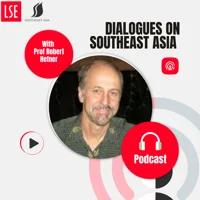
Islam, Society, and Politics in Indonesia. An Interview with Robert Hefner
This episode focuses on the intersection of Islam, society, and politics in Indonesia, the world’s single-largest majority Muslim country and the world’s third biggest democracy. Indonesian Islam is notable for its diversity, its associational strength, and its prominent role in both the transition from authoritarian rule to democracy in the late 1990s and in democratic politics in the country since that time.
To discuss this huge, complicated topic, Dialogues on Southeast Asia turns to Professor Robert Hefner, Professor of Anthropology and Professor of Global Studies at Boston University. Professor Hefner is the author of four major studies of Islam in Indonesia: Hindu Javanese: Tengger Tradition and Islam (Princeton University Press, 1985), The Political Economy of Mountain Java: An Interpretive History (University of California Press, 1990), Civil Islam: Muslims and Democratization in Indonesia (Princeton University Press, 2000), and, most recently, Islam and Citizenship in Indonesia: Democracy and the Quest for an Inclusive Public Ethics (Routledge, 2024). He is also the author of a long list of journal articles and book chapters and the editor or co-editor of no less than fifteen edited or co-edited volumes, many of which serve as foundational texts in the comparative study of religion and of Islam in particular. A towering figure in the study of Islam in Indonesia and in the comparative study of religion more broadly. Robert Hefner’s work spans the disciplines of anthropology, sociology, and political science to cover the intersection and interplay of religion, society, and politics in Indonesia and beyond.
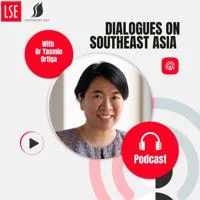
Stuck at Home: Pandemic Immobilities in the Nation of Emigration. A Discussion with Yasmin Ortiga
In this episode, Dr Yasmin Ortiga, Associate Professor of Sociology at Singapore Management University, talks about her latest book, Stuck at Home: Pandemic Immobilities in the Nation of Emigration, published by Stanford University Press. Yasmin is mainly interested in how changing ideas about desirable “skill” shape where and why people migrate. This question has led her to study different groups of migrants - from international students to farm workers. She is best known for her research on migrant nurses, one of the most highly regulated professions in the world. She is the author of Emigration, Employability, and Higher Education in the Philippines (2018). Her latest book, Stuck at Home, is a little different in that Yasmin is now focused on the question of how do people NOT move.
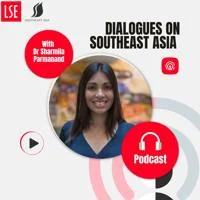
The May 2025 Mid-Term Elections in the Philippines. A Discussion with Dr Sharmila Parmanand
Today’s episode focuses on the mid-term elections in the Philippines which were held in May of this year, including all local elected positions, all seats in the House of Representatives, and twelve of the twenty-four seats in the Senate. The elections have been viewed as a reflection on the administration of President Ferdinand ‘Bongbong’ Marcos, Jr. and as especially consequential for the future of Vice-President Sara Duterte. She was impeached by the House of Representatives in February 2025, setting the stage for a trial by the Senate, but with her continuing popularity making her a serious contender for the presidency in 2028.

Public Healthcare Under Decentralised Governance in Indonesia and the Philippines: A Discussion with Sarah Shair-Rosenfield
This episode focuses on the policy challenges and politics of public healthcare in Southeast Asia, a topic which has become increasingly visible and important in Southeast Asia and in the study of the region over the past decades in the context of expanding public healthcare programs in many countries across the region and the recent experience of the global pandemic.
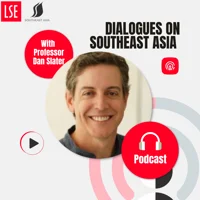
Unpacking Authoritarianism in Southeast Asia: A Discussion with Dan Slater
This episodefocuses on a major issue of enduring importance in Southeast Asia and in Southeast Asian Studies: authoritarianism. Even today, various forms of dictatorship remain alive and well across Southeast Asia, raising questions about their origins, their endurance, and the prospects for their evolution. To discuss these issues, we are joined by Dan Slater, one of the world’s leading specialists on authoritarianism in Southeast Asia and the author of important and influential works on this topic and more broadly on the politics of the region.

Prabowo Subianto and the Decline of Indonesian Democracy: A Discussion with Edward Aspinall
This episode focuses on Indonesia, the presidential election held in February 2024, and the impending inauguration of the winner of that election, former Army general and current defence minister Prabowo Subianto, in a few weeks’ time. Prabowo’s victory in February, events over the past several months, and the imminent transition to a Prabowo presidency have heightened concerns about the state of democracy in Indonesia. To discuss these issues, we are joined by Ed Aspinall, one of the world’s leading specialists on Indonesian politics and someone who has been writing about worrying trends in Indonesian politics for many years.
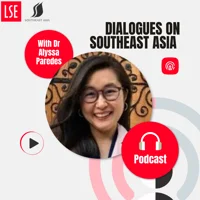
Bananapocalypse: Plantation Southeast Asia and Its Many Afterlives: A Discussion with Alyssa Paredes
This episode focuses on a cluster of issues of longstanding significance in Southeast Asia and in Southeast Asian Studies – plantation agriculture, global commodity chains or supply chains, exploitation of labour and environmental degradation, and resistance. To discuss these issues, we are joined by Dr. Alyssa Paredes, an environmental and economic anthropologist who is an Assistant Professor in the Department of Anthropology at the University of Michigan.
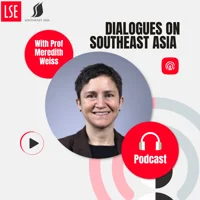
How – and How Much – has Malaysian Politics Changed Since 2018, and Why? A Discussion with Meredith Weiss
In this episode, host LSE Southeast Asia Centre Director John Sidel speaks with Meredith Weiss, Professor of Political Science at SUNY Albany and a leading specialist on Malaysian politics. In the interview, Professor Weiss provides in-depth analysis and insights with regard to the complex patterns of continuity and change in Malaysian politics since the watershed election of 2018.
